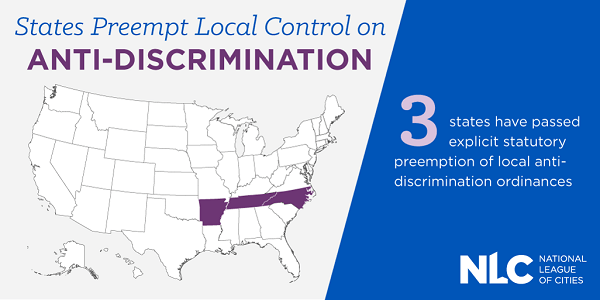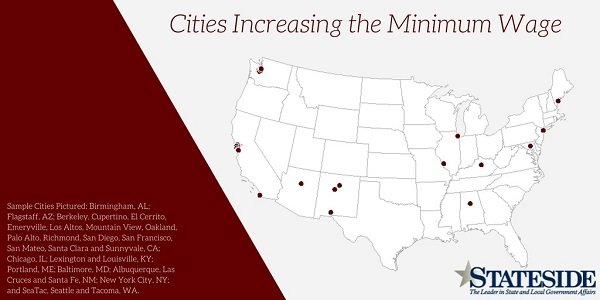Stateside Associates and the National League of Cities (NLC) co-hosted a webinar March 7 examining state preemption and local government issues. The full webinar is below, as well as the audio transcript.
Transcript
Introduction
Tim: Good afternoon, everyone. My name is Tim Riordan and I am Vice President of Client Services at Stateside Associates. I first like to welcome and thank NLC for partnering with us on this webinar addressing local issues in an era of preemption. Thank you for joining the webinar and we are going to get started. But first, some logistics: everyone’s line will be muted during the call. So if you have any questions, please submit them using the chat function and we will do our best to answer all of them at the end of the presentation or follow-up with you afterwards with an answer. So with that, let me hand it over to Brooks Rainwater, who is the Senior Executive and Director of the Center for City Solutions here at NLC.
Brooks: Thanks so much. Good afternoon, everyone. Today we are going to talk about city rights in an era of preemption, which is part of a city-state research initiative that NLC is pleased to conduct with the state municipal leagues. Urgency for this research comes in an important time for our country, one characterized by transition and an evolving relationship between city leaders and their counterparts at the state and federal level. Local leaders must be empowered to adapt policies to meet the needs of their community members, ensuring cities have the tools to build stronger economies, promote innovation and move the country forward.
State preemption efforts can lead to a loss of control for cities and ultimately their citizens. If you haven’t yet seen the report, you can find it in nlc.org/preemption. I will now hand it over to NLC’s Director of Research, Christiana McFarland, to provide an overview of our findings. Thank you so much.
Christiana: Great. Thank you, Brooks and thank you, Tim. Before we dig into the report findings, I want to point out an important distinction that is often overlooked in discussions of preemption. There is a great deal of diversity in state and local relations between, as well as within, states. Generally speaking, states provide either narrow governing authority, known as “Dillon’s Rule,” or broad authority to cities, known as “home rule.” This is defined in state constitutions or by statute enacted by the state legislature. Cities in Dillon’s Rule states are broadly preempted in many of the areas discussed in our report. However, there are many instances in larger cities in Dillon’s Rule states that are granted home rule authorities, like in New York City and Baltimore.
In other instances regardless of home rule status, state law supersedes local governing authority, particularly when a state wants to establish a minimum threshold to which the locals must abide. Our report examines preemption in the areas of economic and social policy. While we draw distinctions between these two policy areas in our analysis, there is a consistently strong linkage between social and economic policymaking and their ultimate outcomes. Specifically, our research covers the policy areas with minimum wage, paid leave, anti-discrimination, ride sharing, home sharing, municipal broadband and a tax and expenditure limitation (TEL). I will provide a deeper dive on some of these issues now.
State Preemption Efforts
Anti-Discrimination
Turning first to anti-discrimination, we know that cities have moved to cement social progress and protect the rights of marginalized groups through anti-discrimination ordinances. These laws may deal with discrimination in the areas of employment, use of public facilities and commercial activities. We know that at least 225 local governments prohibit employment discrimination on the basis of gender identity. Three states have passed explicit statutory preemption of local anti-discrimination ordinances, which you could see here on the map.
Minimum Wage
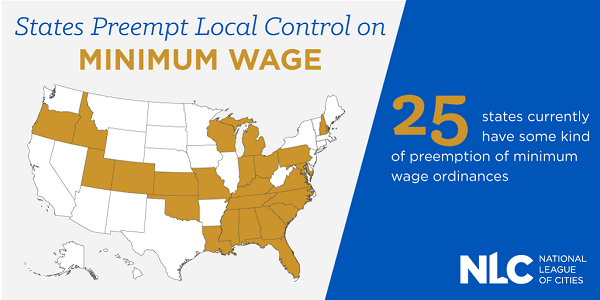
Turning now to minimum wage, twenty-five states currently have some kind of preemption of minimum wage ordinances. Many of these states, such as New Hampshire and Colorado, have had long standing preemption because authority to regulate wages was never granted to cities. A growing number of state legislatures have considered explicit statutory preemption. Alabama and North Carolina are two states that took action in 2016.
Paid Sick and Family Leave
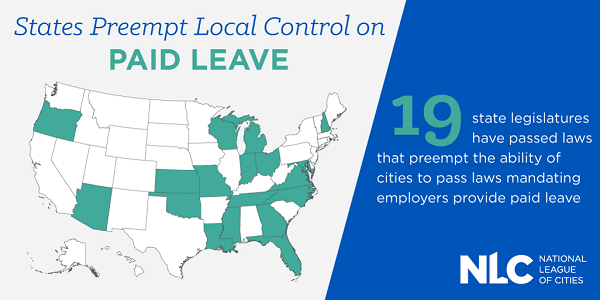
We also look at paid leave, both sick and family leave. We know that there has been a ground swell of local momentum for paid leave. In just the past couple of years, more than 20 municipalities have passed paid sick leave laws. State attempts, however, to usurp local control over paid sick as well as family and medical leave policies persist. Nineteen state legislatures have passed laws that preempt the ability of cities to pass laws mandating employers within their jurisdictions to provide paid leave.
Tax and Expenditure Limitation
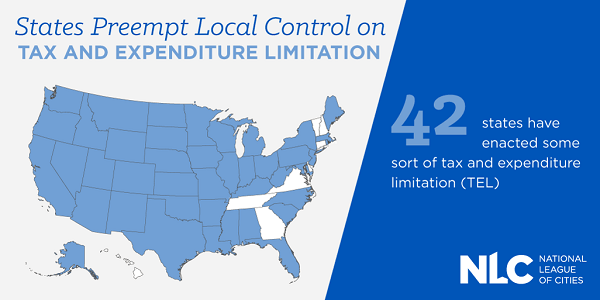
Looking at tax and expenditure limitations, these are state- or voter-imposed limitations on the ability of local governments to raise revenues, spend taxes or both. TELs began in the 1970s in response to voter dissatisfaction with rapidly increasing inflation, property taxes and cost of governments. At the local level, TELs primarily involve property tax limitation. A total of 42 states have enacted some sort of tax and expenditure limitations. Nine states have passed limitation that is less stringent. Twenty-six have passed limitations that are potentially stringent on local taxing authority and seven states have a binding property tax limit and a general limit, which is a very stringent limitation on local authority.
Ride Sharing
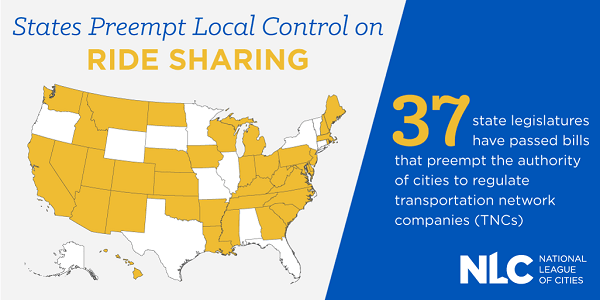
Turning now to ride sharing, when ride hailing companies began to proliferate throughout the country, they were initially found for the most part in large metropolitan areas, but we know that that is no longer the case. Companies like Uber and Lyft, often legally referred to as transportation network companies (TNCs), have entered metropolitan markets of all sizes around the world and serve populations with different needs, cultural inclinations and political orientations.
Thirty-seven state legislatures have passed bills that preempt the authority of cities to regulate transportation network companies in the way that they see fit. Over the last couple of years, legislation was proposed on TNCs in almost every state legislature in the country. Other popular areas of preemption include plastic bags, gunfire safety, nutrition, inclusionary zoning and rent control.
And with that, I am going to now turn it over to Stephanie Reich, the Vice President of State and Local Issues at Stateside Associates. Thank you.
Local Government Action
Stephanie: Thank you Brooks and Christy, and to Emma who works with all the municipal leagues here at NLC. NLC’s report is representative of what we are continuing to see at the local level, but I’m going to share with you a little bit about the state of the cities on some sample issues that we are seeing moving along. Preemptive state policies have been enacted on a range of issues such as minimum wage law, sharing economy, like ride sharing services and short-term rentals that Christy just mentioned, and anti-discrimination laws.
However, we continue to see very, very active local governments tackle and work on issues that are extremely important and relevant to them. But I want to preface my presentation by saying that similar to policy actions cascading down from the federal government to state governments in the 80s and 90s, policy action is now cascading from the state level to the local level of government. There are many reasons why this is occurring and I’m going to share with you some of them in no particular order.
Local government is taking a more active and prominent role in advocating policies to protect budgets, residents, infrastructure and generally wrestling control from the state and federal government. Another one is local government is moving much more quickly than state or federal government can. They’re smaller, they’re more agile and in many instances less bureaucracy stands in the way. And local policy makers and elected officials are very accessible and usually more responsive than their state and federal colleagues.
I think a lot of us who do work in this area see how social media, like Facebook and Twitter, have played a role in this. And activists and advocates are finding state governments to be a frustrating venue for advancing especially progressive policies, which I think Christy, again, just highlighted.
I want to also share that one-party dominance at the state level of government is really showing how the preemption that Christy’s and Brook’s work show us. Sixty-eight of 99 chambers are controlled by Republicans and 25 states are controlled by Republican governors and legislative majorities. However, it is important to know that local organizations like NLC, the National Association of Counties and U.S. Conference of Mayors are empowering local officials like never before. Local elective leaders now have a national stage and resources to support them. Look at the case in point, we’re doing a webinar today with National League of Cities.
To put this in context, I have with me today Peter Finn, and he is one of my lead associates and who I might or might not have pushed from other departments here at Stateside. I want point out how active local governments are: he’s been with me now for about 14 months and he is close to hitting his 10,000th alert – we are about 400 away – just to show you how active on some of the issues that we cover for our clients. Local governments are moving things.
I want to share that as local government relations professional with over 14 years of local government experience, I think it is important for government relations professionals to pay attention to both state and local governments. Especially, again as the report shows and you saw on their slides, it’s especially important as issues ping-pong between local and state governments. I’m going to go ahead and share with you what we’re seeing especially when it comes to minimum wage.
Minimum Wage
For example, 34 cities have enacted minimum wage rates that are higher than their states. Last night, Baltimore passed the minimum wage bill on first reading and can be voted on second reading as soon as March 20th. But then to Christy’s point, look at states like Missouri. Kansas City and St. Louis both passed minimum wage laws. Missouri passed a law that attempted to preempt the local laws. It went to court and recent court decisions are impacting mayoral and city officials.
This morning, it looks like the Kansas City mayor announced that given how much he wants to move minimum wage forward in Kansas City, there may not be the will to do so right now. And then again in Birmingham, Alabama, last week residents filed a suit against the state saying that Alabama lawmakers discriminated against Birmingham residents by preempting a minimum wage ordinance to raise the city’s minimum wage.
So I think to Christy’s point, while there is preemption happening, cities are still moving and still struggling with how to deal with wage issues in their cities. And as we know, bills and other actions move quickly at the local level regardless of what courts find in any one jurisdiction. It’s likely that cities will continue to act and respond to issues that are important to their residents, so we need as government relations professionals to pay attention especially to the issues that we’re talking about. And then again, we’re still seeing issues like short-term rentals, minimum wage, plastic bags and taxes at the local level.
Local Taxation and Fees – Sugary-Sweetened Beverages and Plastic Bags
Cities are struggling to raise revenue in this new era. Many are looking now to tax sugary-sweetened beverages, a.k.a. what we know as the “sugar tax,” and plastic bags. We have seen ballot measures in California and Colorado cities, like Boulder, for sugary-sweetened beverages, more recently in Santa Fe, who is trying to work on a budget, Philadelphia and Seattle.
Since January, 13 states are also considering these types of taxes.
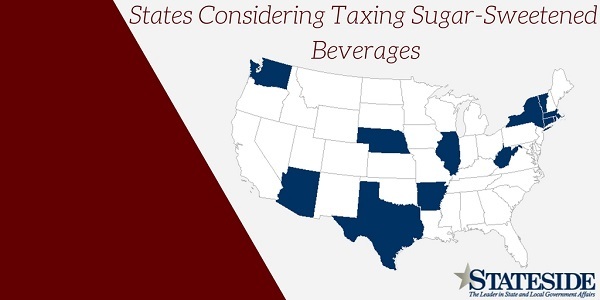
And with plastic bags, we know in New York, the governor announced that he would like to supersede any local plastic bag ordinances, but there are many jurisdictions in New York City. And on our maps, we’re just showing a sample of cities that are still struggling with plastic bag issues, especially in the northeast, like Massachusetts.
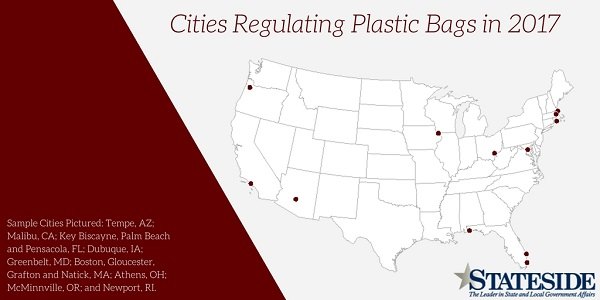
Autonomous Vehicles
Again, the sharing economy and new technologies are also moving quickly at the municipal level. Look at autonomous vehicles. Boston and Pittsburgh have moved swiftly to identify and work with companies to have them come to their cities, but still the state and federal governments are also struggling with those issues.
Short-Term Rentals
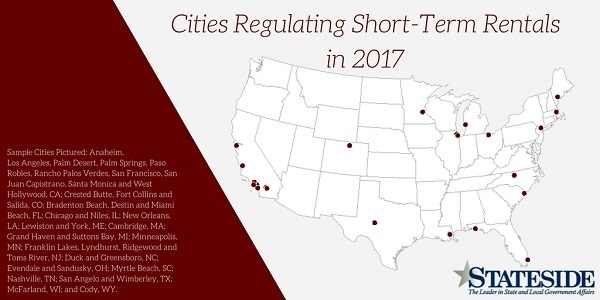
And then there’s always the topic of short-term rentals. I just want to point out that there have been over a hundred short-term rentals bills introduced this year, along with others being reconsidered, like Nashville, who after passing it last year is going back to tweak it. So, I think it’s really important for us to pay attention to cities because there is no single approach and there is no consistent terminology at the state or local level on these issues. Peter and I have found especially when it comes to short-term rentals that they are called all different sorts of things. Peter, why don’t you go ahead and share with us what some of those things are called?
Peter: Sure. Given the volume of short-term rental legislation passed it is not surprising that a lot of these cities are employing new terminology. There have been a number of local measures using different terminology. Certain regions are introducing new language for these issues. Arlington County in Virginia, for example, has a measure pending this year using the phrase “accessory homestay,” which is new, while Bozeman in Montana recently used the phrase “tourist home,” which has begun to catch on quite a bit from what we’ve seen. Aside from that, we’ve seen such terms as the classic short-term rentals, vacation rental, vacation home, transient lodging, tourist home, like I said, home share or just homestay.
Stephanie: So again, as we have been working with National League of Cities on talking about preparing for this webinar, we can see from the research that they did and what we’re seeing at the local level, local governments are still very active, they still have the dilemmas of being controlled by different governing factors in their state and in their state constitution. But it’s important that we all pay attention to both state and local government as we do our work in this area.
Questions
Tim: So, with that we’re open to any questions. I apologize for any audio difficulties that folks might have had. Hopefully everyone is on now, but if there’s any questions, feel free to submit them via the chat function. So, I think we have the first one and this looks like this is for the folks at NLC.
In general, how are cities reacting to the preemptive measures from the states?
Brooks: Cities are reacting to preemptive measures from states in a number of ways. Ultimately, people who live in cities want control of their own destinies, but when states seek blanket policies that run counter to the values of its cities, local leaders do not stand down. Loss of local control means that cities cannot curtail laws to fit their needs, creating economic implications especially when physical authority is limited. Preemption can also have human rights implications when social policy affects groups like the working mothers or the LGBT community.
Tim: Excellent. Thank you. Stephanie, anything to add on to that?
Stephanie: No. I think Brooks is right. I think what we see across the nation is that cities – or counties to include them as well – see that the legislation that they spend a lot of time on fighting for residents is either being preempted proactively or reactively. I think they do stand their grounds and as evidenced by both St. Louis and Kansas City, they went to court to be able to protect the rights of their residents as much as they could.
Tim: Excellent. So another one. Stephanie, this one is right for you and Peter.
Realistically, how often are these issues really appearing on agendas? How much do you see them?
Stephanie: I think almost every day. I think there are issues that are very important to cities, and besides, where most people think that they’re just there to tax them or to do their budgets, there are issues that affect residents that cities have the authority to legislate and to implement. And short-term rentals that we talked about, ride sharing, some of the issues, paid leave, wage equity, these are daily occurrences, plastic bags, environmental issues. I think they’re just… cities are struggling with what to do and want to do the right thing. And so, they’re looking to make policy decisions for the residents that elected them.
Tim: All right. The next one is, looks like for both teams.
What rights do cities have in terms of state preemption? What is the dynamic?
Brooks: I mean the dynamic is this is really challenging for cities because the U.S. Constitution does not mention local governments. Instead, the 10th Amendment reserves authority giving powers to the state. So, you know, while this is the case there is a great deal of diversity in state-local relations between, as well as within, those states. As Christy mentioned at the outset, generally speaking states provide either narrow, through Dillon’s Rule, or broad, through home rule, governing authority to cities defined in the state constitution and by statute enacted by the legislature.
So kinda breaking those down, Dillon’s Rule allows state legislature to control local government structure, methods of financing activities, its procedures and the authority to make and implement policy. Due to the rigidity of Dillon’s Rule rule, some states began to adopt home rule provisions in the early 1900s. Home rule limits the degree of state interference in local affairs and delegates power from the state to local governments.
Stephanie: I think Brooks is right in the sense that, you know, cities struggle with this on a daily basis. Sometimes they do look to the state and federal government for some of their financial resources, but residents look to them for the everyday policy making and want some action taken on issues that are important to them.
Tim: I guess last question or another question.
What can cities do when they face states that are overreaching or states that are trying to exert control over them?
Brooks: Sure. From our perspective at the National Leagues of Cities, we see really three critical recommendations on this point. Starting first with mayors and other local leaders using the bully pulpit that they have and engaging in active communication with their state legislators. Secondly, we really think you should choose preemption battles wisely. Often times there’s a lot of choice to be made here from a legal fight perspective and figuring out where you can martial the resources to really actively go against these laws constraining cities’ availability to pass policies are really the way to go.
And finally, address the preemption narrative directly, particularly focusing on economic arguments, because this is really where we can bolster the resources at the local level to make a strong case to allow cities to pass and kind of implement the laws that they’re trying to do.
Stephanie: And I think I would add, to go on a point that I made earlier, groups like National Association of Counties, U.S. Conference of Mayors and the National League of Cities are resources for city officials who can come together. NLC has their conference here next week in DC to share best practices, to talk about the issues that are important to them, how they’re struggling with the issues maybe, you know, both at the national and federal level.
I know NLC has a lobby day and they talk to their federal leaders to work on these issues. And all of these are issues that are facing cities alike from East Coast, West Coast, north and south. And I think when they come together in an organization that also allows companies to participate and hear from companies about issues that are important to them. I think there’s a two-way conversation that is able to happen.
Tim: Last question.
Is it realistically possible to stay on top of all these issues, considering how many cities are around the country? What would be the best practices as far as trying to stay on top, to prioritize, or to stay engaged?
Brooks: From our perspective here at the National Leagues of Cities, we’re certainly listening to our members and seeking to, you know, track and actively do research and look at kind of policy recommendations on issues that they bring to us. When we did this particular report, the seven areas that we tested for really were a reflection of what we’ve been hearing from the state leagues as well as city leaders on the ground. And so, that’s really how we try to kind of look through this as a city-centric lens, thinking about, you know, what issues are important for cities. It’s hard though, with all of the municipalities out there, 19,000 of them. I can imagine that the job you all are doing trying to track the ordinances taking place can be tricky at times.
Stephanie: So, Brooks, if I could just ask you, I think for those of us on the call not everyone may know, who are your members? Is it just mayors, is it council members or is it the city officials? Do they have to be elected in general? And can you say – I know we’ve both talked about municipal leagues – can you say who are members of those, as well?
Brooks: Sure. So the way that we were structured is 92 years ago the state municipal leagues, which are smaller versions of the National League of Cities, created the National League of Cities. And so now we partner with the municipal leagues and through both us and them, we represent 90% of all communities. So from the smallest town to the largest city, and we represent the full city, so while most of all we have the mayors and city council members engaged with us at our conference, all members of the city are welcome and even on our policy committees we have staff that does engage as well.
Stephanie: Following the question after you answer it again, what are the issues that I think are the hot topic that may be coming up at your conference next week that your city officials are struggling with?
Brooks: Sure. So one of the things we do on an annual basis is our state of the cities research, which allows us to look at mayoral state of the city speeches and find out what are the critical issues. And so, as we’re driving our advocacy agenda we look at the top three there, and as our CEO always talks about it is PIE – it is public safety, infrastructure and economic development. And those consistently come up as top issues for city leaders, that’s what we’ll be lobbying about this year.
Stephanie: And I think too, I would agree that’s what we’re seeing on city agendas, same, public safety a lot. As you can imagine infrastructure and economic development, I think as the pieces of the pie gets smaller, they have to figure out how to make the pie get bigger and go to more family members. Right? And so, those are issues that I think it’s how they get there is what we see on the issues that they are tackling and sort of like we’ve talked about especially with the new economy and the internet of things and changing, you know, a lot of cities need to catch up with where their statutes are.
You know, a fun story while I was working in government is that for a certain type of hearing you could only do court reporting, because that’s what the statute dictated. I didn’t even realize that technology had come so far that we can do recordings like a WebEx that we could do today and have those testify via Skype, you know, so just to think about where technology is in your city and how to advance it, and I think NLC also has a study coming out about economic development in the cities which we see had to tackle not just incentives, but retention and to keep companies and jobs, you know, there especially in jurisdictions like DC where you have surrounding jurisdictions so close, who may have disparate minimum wage laws, you know, how do you retain that economic development? So I think it ties all of your research together and what we’re seeing at the local level.
Tim: Well, great. Any parting thoughts for, you know, I think that wraps up the Q&A session. I’d like to thank everybody for participating. Again, I know we had a little but of audio issues in the beginning, but we will be sending out the video file along with the slides to the folks who may have missed the beginning. And they will follow this call either later this afternoon or first thing tomorrow morning. But, thank you everyone for participating. And if anyone has any follow-up questions, please feel free to reach out to any or all of us that are on call. Have a great day, everyone. Thank you.

